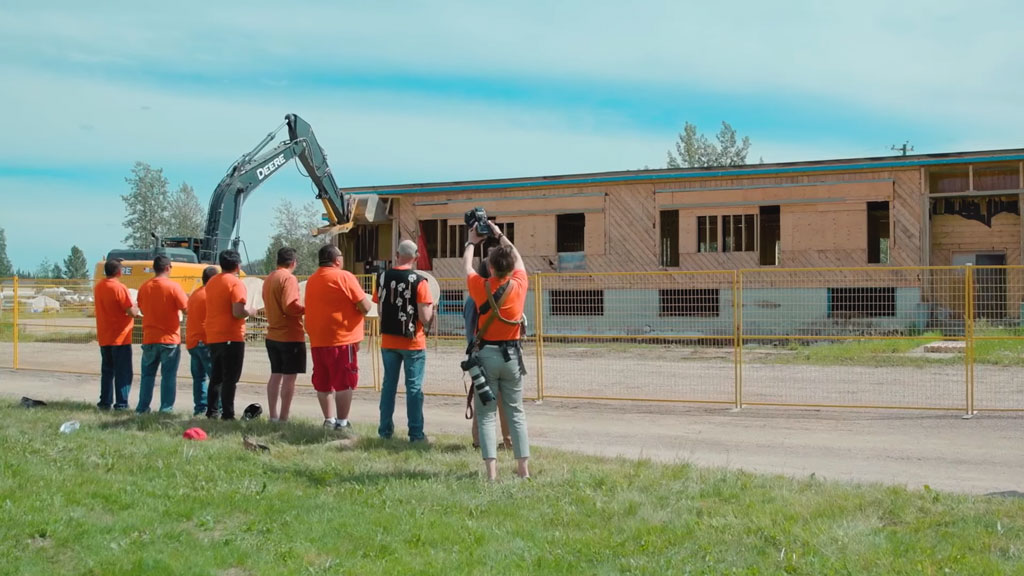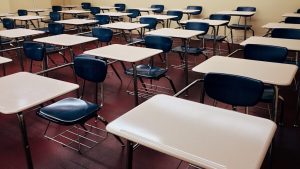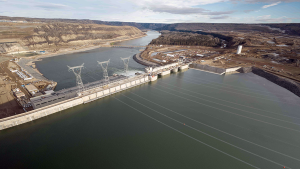B.C. and Yukon officials gathered to remember and reflect on the demolition of the Lower Post residential school which took place last summer. They also released footage of the demolition and interviews with residential school survivors.
From 1951 to 1975 the school impacted thousands of children and their families in the region. The demolition of the school came after an outpouring of anger swept across the country following multiple discoveries of mass graves near residential school sites.
Officials released a new video that documents the 2021 demolition which was hosted in the Kaska Dena community of Lower Post. Over the course of the day, a ceremonial demolition of the Lower Post residential school took place, followed by a blessing of the ground for a new cultural centre.
The events were witnessed by members of the Daylu Dena Council, Liard First Nation, Taku River Tlingit First Nation, the Tahltan people, the Kaska people and residential school survivors from throughout the North.
As part of the video screening, Premier John Horgan and Deputy Chief Harlan Schilling participated in a conversation with Nathan Cullen, minister of municipal affairs; Tristan Miller, member of the Daylu Dena Council; and Rose Caesar, Liard First Nation Elder and survivor of the school. Sandy Silver, Yukon’s premier, also shared his reflections on the video in a recorded greeting.
“It was a dark cloud over this community for my entire life. For more than 35 years the chiefs, the community and the survivors have worked to tear that building down,” said Schilling.
Caesar noted long after the residential school closed, the building was used for government meetings. The building served as office space until it was permanently closed due to water damage in June 2020.
“It was so disrespectful because it affected so many First Nations children,” she said. “They may tear down that school, but the memories and the trauma are still with us. They stole our identity, our language, our connection with our family, our mothers and a lot of things.”
She urged other Indigenous people who still suffer from the impacts of the residential school system to get the help and support they need to begin their healing journey.
Caesar said in the years following her traumatic experiences she turned to drugs and alcohol but was able to overcome it.
“Drugs and alcohol are not our culture,” she said. “They never were. I found my way out and I am proud to be where I am today. I have a responsibility to my children and grandchildren.”
Horgan recounted his visit, saying it was a profound experience for him and his wife.
“There is history going back thousands of years that is positive and focused on the land and the animals and the people,” said Horgan. “So if we can erase the bad period of the residential schools, celebrate the past and build a brighter future for the next generation, then we have done good work.”
The premier recalled being overcome with anger before the demolition and launching a rock at the building.
“It was the size of a baseball. I scooped it up and I threw it as hard as I could and the sound, the crack, felt like it filled the valley,” he said. “It was like shaking my fist at the residential school system one last time. It was deeply moving and I will never forget it.”
Silver also gave his remarks on the demolition as many of the school’s victims were taken from the territory.
“It was a ceremony with so much weight and it was so necessary and a long time coming,” said Silver. “The Lower Post residential school was located in B.C. but many of its students were taken from Yukon First Nations communities. Many survivors and their family members live in the Yukon and the devastating effects of residential schools continues to be felt. The border between B.C. and the Yukon does not belong to these First Nations communities.”
A new community centre is being built on the demolition site. The new facility will provide recreational, educational and cultural spaces for older youth and Elders and the broader community, and will accommodate administrative offices for the Daylu Dena Council.
The facility will include program rooms for beading, storytelling and Elder’s Tea, an indoor gym, an industrial kitchen, a garden and other outdoor recreational areas.
Ottawa will spend $11.5 million to build the new facility, including $10 million from Infrastructure Canada’s Community, Culture and Recreation Infrastructure Stream of the Investing in Canada Infrastructure Program, and $1.5 million from Indigenous Services Canada.
The Government of British Columbia is contributing $1.5 million, and Daylu Dena Council is contributing $538,960. Indigenous Services Canada is providing an additional $1.3 million to remove hazardous materials and demolish the remaining structure of the former residential school.
“As we destroy this colonial system and this building that represents the worst, Kaska brothers and sisters, you will build something better,” said Terry Teegee, regional Chief for the B.C. Assembly of First Nations, during his remarks at the ceremony. “You will come back better. We will take our language back, our culture, our people, our children. That is what reconciliation is.”
The full video and discussion can be viewed here.
A National Indian Residential School Crisis Line is available to provide support for residential school survivors. Survivors can access trained crisis counsellors by calling the 24-Hour National Crisis Line: 1 866 925-4419.
Follow the author on Twitter @RussellReports.











Recent Comments